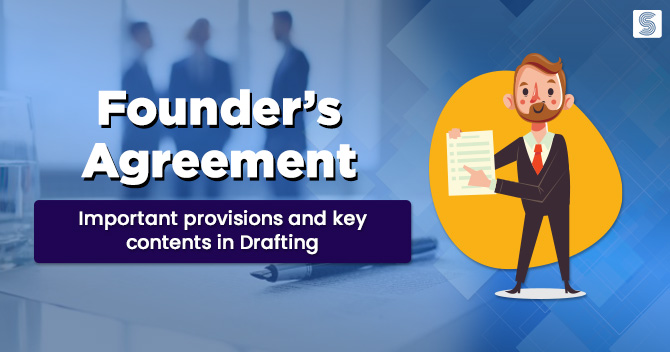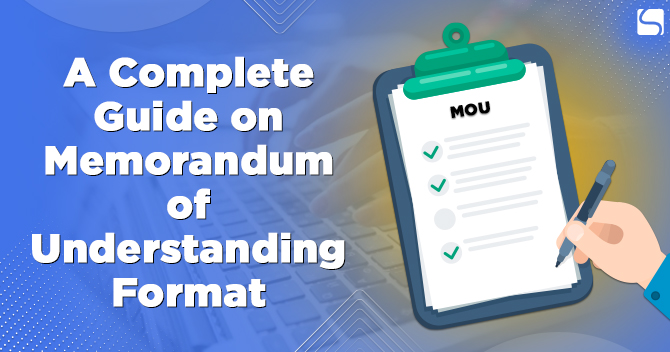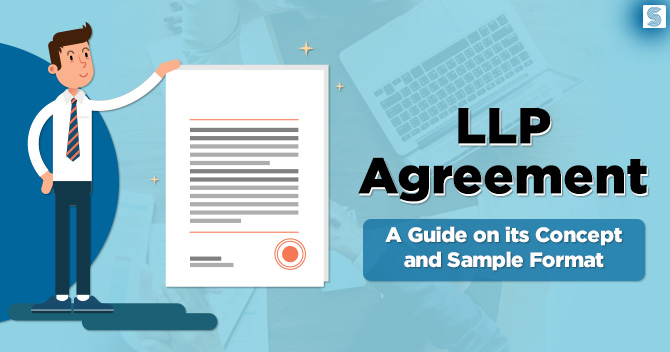Founders Agreement: Important provisions and key contents in Drafting

Ashish M. Shaji | Updated: May 02, 2020 | Category: Legal Agreements
Table of Contents
Overview
When a company is in its incorporation stage, it is best to have a legal agreement that lays down the roles and responsibilities of the persons associated with the company. There are a number of legal agreements that can be entered into for the better functioning of the company. One such agreement between the co-founders of a company is known as the Founders agreement. Usually, an agreement is drafted in the incorporation stage to avoid any ambiguity that may creep up in the enterprise in the future. The legal agreement between the co-founders specifies the roles and responsibilities of each co-founder. In this article, we shall have a basic knowledge of the Founders agreement and its key inclusions while drafting.
Meaning of Founders Agreement
A founders agreement is an agreement which is in written form between the co-founders of a company. It is also called a Co-founders agreement or a start-up Co-founders agreement. While commencing a business, the founders of the company make an agreement for setting up the business. The agreement specifies the rights, ownership, initial investments, responsibilities, duties, and liabilities of the co-founders of the company. As a legally binding document, the agreement must be in detail, and the absence of loopholes should be ensured lest be exploited in the future.
Who are the Parties to a Founders Agreement?
The parties to such an agreement include the two or more partners who are known as the Co-partners or shareholders in a company.
What is the need of a Founders Agreement?
As we all are aware that there are things in life that are uncertain, but it may happen in the future like the death of the co-founder or any business conflict or any ambiguity relating to any rights, liabilities, etc. Therefore, in order to avoid the loss caused by such uncertain events, an agreement such as this will ensure the safety of each founder of a company. The founders’ agreement identifies any possible prospective risks or any complications that may arise during the business. It proposes provisions to deal with such a situation or helps in avoiding such a situation.
The agreement is just like an insurance against any uncertain event. It provides a structure to resolve the dispute among the founders and clarifies the role of each business owner. This legal agreement also protects the interests of the minorities and provides enough light on whether or when a partner wishes to exit or enter the business. No one can predict the future but can control the present therefore consulting an expert prior to drafting a founder’s agreement is highly recommended so that all the necessary inclusion are made in the agreement, and even if the situation shifts in the future, it is not a big deal for you.
Things to consider before drafting a Founders Agreement
There are a few vital aspects that must be considered prior to drafting of a founder’s agreement so that all possible ambiguities are avoided. Before drafting, there must be a sincere discussion about among all the co-founders regarding the management, investment, ownership, remunerations, etc. the clarity among the founders must be reflected in the agreement. Every detail regarding the components of the agreement should be discussed thoroughly and where the conclusion is uniformly accepted by all co-founders.
Another critical consideration to be made is pertaining to the protection of the rights and interests of shareholders. The agreement should involve proper framework so that there are no foul strategies in the business that affects the minority shareholders. The assistance of an expert should be preferred while drafting so that the interests of all, including the business, are secured in all manner.
Key Contents of a Founders Agreement
When drafting a founders agreement, there are certain essential inclusions that must be included in the agreement so that there are no issues in the clarity of the document. The key contents are specified below.
- Name of the co-founders and Business
The agreement should contain the name of the co-founders and the company for which they are agreeing the rules. The agreement must describe the company’s venture and its purpose in detail.
- Details of ownership
The details of the ownership must be specified clearly in the agreement. The ownership shall be distributed in shares or percentage of the company’s value.
- Roles and Responsibilities
The role of each person must be explicitly mentioned in the agreement. Making assumptions regarding the roles and responsibilities may lead to conflict in the business. Different co-founders may have a different point of view regarding his role from the other. The undefined roles lead to ambiguity and may threaten the future of the company. Therefore what each person would do and the extent of their responsibilities should be clearly laid down. The role that an individual shall play in the future must be designated in the agreement right at the start. It is highly imperative to pre-define the roles and responsibilities in the agreement.
- Initial Capital
The initial investments to the company’s development must also be included in the agreement.
- Details of Capital raised
The agreement shall also include the details about the capital raised by the investor and the founders of the company.
- Conflict resolution
The process and procedure of conflict resolution must be included as they are an inevitable aspect of any long term business. Conventional methods of resolving conflicts include arbitration or through a neutral party who is engaged with trust etc. The express provision of conflict resolution in the agreement at the beginning itself shall help in making the matter easier.
- Confidentiality
It is one of the essential clauses of any agreement. The confidentiality clause shall impose an obligation on the co-founders to keep the sensitive matters related to the business confidential.
- Compensation
The issue of compensation or salary drawn by each of the co-founders and the determination of the compensation are critical aspects. General perception could be that one who invests large sum in the company’s finances would also receive larger remuneration. At the same time, it must be noted that risk tolerance differs from each individual. All these matters should be taken care of right at the beginning.
- Removal of Founders
The clause mentioning the removal of founders is a necessary clause, and the detail regarding when and how a founder shall be removed must be addressed in the agreement. The absence of such a clause may lead to future conflict. The act or circumstances under which a founder can be fired should be laid down with each co-founders assent. These circumstances may include the offense of fraud with the company, unjustified absence from the work, or any other situation which makes them incapable of carrying out their business.
- Dissolution of the Company
The details regarding the situation under which the business shuts down or what shall happen if the business becomes unviable and how shall the founders distribute liabilities, assets, or any money when the business is terminated, should be included in the agreement. Each situation could be a possibility; therefore, every aspect must be covered.
- Miscellaneous Provisions like Copyright Assignment, Non-compete clauses etc.
Once your business expands on a product or platform, it implies that you have started creating an Intellectual Property. It’s essential to clarify as to what pertains to your company and how it shall be used to protect your ideas. It must be designated how an Intellectual Property is of your company and not of individuals like owners, employees, etc. The terms for selling IP and who gets the revenue may also be outlined in the agreement.
A non-compete clause is a vital part of the agreement that ensures that the founders don’t branch out and commence their own businesses and begin competing with the original business. One may require the founders to enter a separate contract of employment with the incorporated business once the incorporation is completed. A non-compete of 3 to 5 years is common.
- Loan from founders
The handling of loans received from the founders must be included in the agreement. It can be paid back with interest or without interest, or it may be compensated through the issuance of shares of the incorporated entity. This issue is common among the founders as they loan money to a business without investors so that their business is kept afloat. Founders lending money may, at some stage, feel that their contribution to the business is not rewarded justly, so it must be dealt with in the agreement.
While drafting the founder’s agreement, a legal expert must be consulted; this will help in eliminating loopholes that may be exploited later.
Procedure to be followed for Founders Agreement
- Have sincere discussions with the co-founders regarding the role of each individual, compensation process, termination clauses, or any other concerns. Cover every factor so that there are no problems later.
- Then consult a legal expert who shall make you known about the process. He may make essential additions or omissions to the agreement if necessary.
- Once the objective of the agreement is clear, the lawyer will draft a sample of the agreement.
- The sample of agreement shall be sent to you for your review. Discuss it with your co-founders.
- Finally, the document is signed by all the co-founders, and unless it is signed and dated, it won’t be legally binding.
- The complete process takes about 3 to 4 working days.
Advantages and Disadvantages of a Founders Agreement
Advantages-
When a new business is established, everyone is excited about the opportunities and the journey ahead of them. While it is an excellent plan to remain positive and plan for success, but planning must also be made for potential pitfalls in the journey. Questions like what happens if things don’t go as planned or how do I protect my business must not be ignored. One should consider these issues and talk with your co-founder about covering all of those in the agreement upfront. It will ensure that your business is not left in tatters.
The business partners must have discussions and align their expectations before they draft the agreement. In case you don’t have a founders agreement, then it would be difficult to navigate when an issue arises. Failing to plan in advance can put your business in difficulty before you start. Absence of such an agreement not only may lead to endanger your business, but it may also cost you hard as you may require to pay legal costs and other costs to keep your business afloat.
Having such a legal agreement shall provide more clarity to the roles and responsibilities of each co-founder and shall help in facilitating a strong relationship among the partners. It shall help in resolving the disputes quickly and shall clear any doubt among the founders. The chances of arising ambiguities are also less, and even if it arises, it can be cleared by referring to the agreement.
Disadvantages-
There is least number of chances of having a disadvantage for having the agreement in place, and the slight disadvantage that may exist often arises due to having agreements that are not well-drafted or that which lacks precision. Proper advice and caution are needed because being overly prescriptive or an imprecise agreement can invite disputes.
The above-mentioned points may help founders to lay a strong foundation for their business relationship and for the growth of their company.
Conclusion
A founders agreement may not seem like an exciting or a crucial part of being a business professional, but the fact of the matter is it is an essential and fruitful agreement. There have been many establishments that have struggled due to lack of such an agreement; therefore, keeping in mind what it brings to the table, it is suggested to draft a Founder’s agreement upfront when you are starting a new business.














